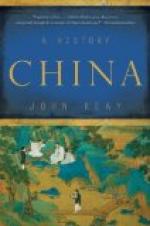Men like Chou Tun-i (1017-1073) and Chang Tsai (1020-1077) developed a cosmological theory which could measure up with Buddhistic cosmology and metaphysics. But perhaps more important was the attempt of the Neo-Confucianists to explain the problem of evil. Confucius and his followers had believed that every person could perfect himself by overcoming the evil in him. As the good persons should be the elite and rule the others, theoretically everybody who was a member of human society, could move up and become a leader. It was commonly assumed that human nature is good or indifferent, and that human feelings are evil and have to be tamed and educated. When in Han time with the establishment of the gentry society and its social classes, the idea that any person could move up to become a leader if he only perfected himself, appeared to be too unrealistic, the theory of different grades of men was formed which found its clearest formulation by Han Yue: some people have a good, others a neutral, and still others a bad nature; therefore, not everybody can become a leader. The Neo-Confucianists, especially Ch’eng Hao (1032-1085) and Ch’eng I (1033-1107), tried to find the reasons for this inequality. According to them, nature is neutral; but physical form originates with the combination of nature with Material Force (ch’i). This combination produces individuals in which there is a lack of balance or harmony. Man should try to transform physical form and recover original nature. The creative force by which such a transformation is possible is jen, love, the creative, life-giving quality of nature itself.
It should be remarked that Neo-Confucianism accepts an inequality of men, as early Confucianism did; and that jen, love, in its practical application has to be channelled by li, the system of rules of behaviour. The li, however, always started from the idea of a stratified class society. Chu Hsi (1130-1200), the famous scholar and systematizer of Neo-Confucian thoughts, brought out rules of behaviour for those burghers who did not belong to the gentry and could not, therefore, be expected to perform all li; his “simplified li” exercised a great influence not only upon contemporary China, but also upon Korea and Annam and there strengthened a hitherto looser patriarchal, patrilinear family system.




